The REU program is supported by an award from the U.S. National Science Foundation (Award #1950651) to Duke University as part of the Research Experiences for Undergraduates Program. The Duke Psychology and Neuroscience REU provides underrepresented students with the skills, socialization, connection, and continuity to begin developing a scholar-researcher identity. This REU offers a truly unique research experience using a combination of methodological approaches across the life-span and across areas of psychology: Developmental, Social, and Cognitive Neuroscience. During this REU, students will get hands-on experience conducting experimental and observational research in addition to individually-tailored academic writing and GRE preparation sessions. Students will participate in weekly lab meetings, small group meetings, and one-on-one sessions with their mentors in addition to meeting with other Duke undergraduates and faculty.
This REU is jointly led by three faculty members whose research covers many areas of psychology and neuroscience: Makeba Wilbourn (developmental psychology: culture and experience effects on language learning), Sarah Gaither (social psychology: identity and diversity), and Gregory Samanez-Larkin (human neuroscience: motivation and decision making). Students who are admitted into the program will join one of these primary labs but also participate in regular activities with all students in the program from across the three research groups.
The first session of this REU occurred during summer 2020 (May 12 – July 16) and was a virtual program with no costs that provided students with a summer stipend. The second session during summer 2021 (May 11- July 9) was a hybrid program (in-person + virtual) where students were provided with a stipend. The third session will occur again during summer 2022 (May 22 – July 24).
In 2022, if it is safe, we will host an in-person program with no costs associated with participating. Travel expenses, campus housing, and a living stipend will be provided. We also hope to bring alumni from the 2020 and 2021 virtual programs to Duke campus as a group once it is safe.
Research Training
Students will gain experience with…
-
Developing research questions
-
Planning and designing research studies
-
Collecting behavioral, observational, and/or neuroscience data
-
Recruiting human participants from the local community
-
Analyzing data
-
Disseminating and presenting research
Professional Training
Students will participate in…
-
individually-tailored academic writing and GRE preparation sessions
-
weekly small group lab meetings
-
weekly one-on-one meetings with faculty mentors
-
networking with other Duke undergraduates and faculty through participation in the Duke undergraduate Vertical Integration Program
-
poster and oral presentation training
-
statistics workshops
Eligibility for the Duke REU program requires:
-
U.S. citizenship or permanent residency (Unfortunately, international student visas do not make you eligible for this program for federal grant purposes)
-
Full-time undergraduate student status (priority to rising sophomores and juniors) in a baccalaureate or associate degree program who will return to home institution after the program. All undergraduates and graduating seniors are eligible.
-
(Previous research experience is helpful, though not required)
A primary objective of this REU site is to include students who have had more limited access to research opportunities and/or attend non-Research I universities, Historically Black Colleges and Universities (HBCUs), Hispanic Serving Institutions, Tribal Colleges and Universities, or are students from other groups underrepresented in science or first-generation college students. Duke students (from underrepresented groups) can apply, but priority will be given to students outside of Duke. A program goal is to enhance undergraduates’ future applications to graduate school in psychology or a related field. In addition, this REU site offers a rare opportunity to participate in a research program with other students working across different areas of psychology and neuroscience. This is intentionally modeled to prepare students for future graduate programs where peer cohort members are working across different areas (and eventually for faculty positions which have the same composition).
Application
To apply for the summer program in 2022
-
Complete this application form.
-
Identify someone to write a letter of recommendation (letters will be requested for applicants who make it past the first round of review)
Timeline
The internship is a full-time commitment (~40 hours/week; M-F 9:00 AM – 5:00 PM), for the entire duration of the internship: May 16th through July 15th. All students are expected to participate for the entire session. There is not an option to start late or finish early. Applications must be completed on or before February 27th, 2022 for consideration.
Questions?
If you have any questions, please contact Raisa Ahmed (program coordinator) at Raisa.ahmed@duke.edu or Talita Ahmed at talita.ahmed@duke.edu


WILD (Wilbourn) lab members at a holiday party and presenting at a conference.
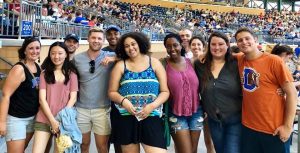
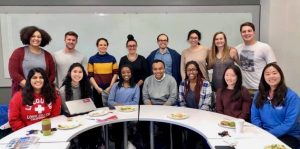
ID (Gaither) lab members at a Durham Bulls game and in a meeting on Duke campus.

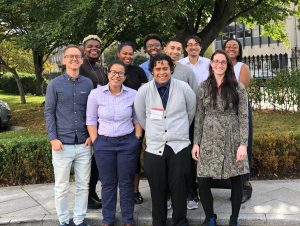
MCAB (Samanez-Larkin) lab members after a group dinner in downtown Durham and at the Neuroeconomics conference.
Alumni testimonials
“The WILD team and Dr. Wilbourn not only made this experience rich in learning, but they allowed this internship accessible to folks like me who, because of financial constraints and other unrepresented identities, do not always have equal access to the same opportunities. The socialization among prominent academic figures allowed me to gain immense insight that I would not have otherwise been subjected to coming from a smaller liberal arts institution with a one-room psychology lab. My summer in the WILD played a large part in my work thus far and I hope the WILD continues to be a place and space of growth for others.” –Stefanie Gaudio, former WILD summer student who is now a graduate student in the University of Pennsylvania’s School of Social Policy and Practice

“I really enjoyed my time in the Duke ID Lab. Everyone was so supportive and helpful in terms of research as well as giving me the overall social support I needed to succeed. During my time in the lab, I developed many important research skills and habits that were critical for my success now as a graduate student.” –Felix Wu, former Duke ID Lab summer student who went on to become a NSF GRFP recipient and PhD student in Organizational Studies at Rice University
Some REU Summer 2021 memories!
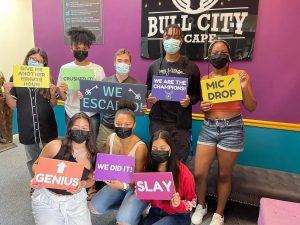
BullCity Escape Room outing (We escaped)!
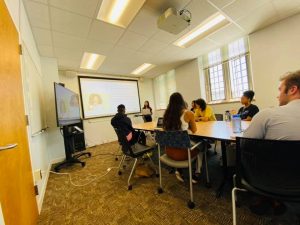
Audience POV of research presentation day!
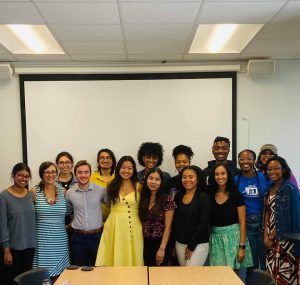
Final day group picture with the incredible team!

